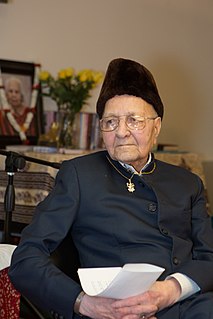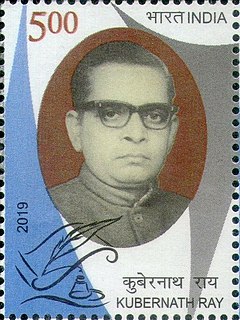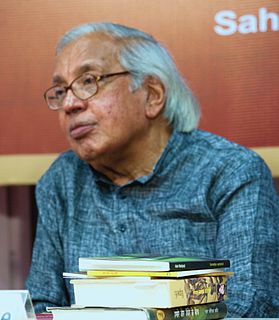Sachchidananda Hirananda Vatsyayan, popularly known by his pen-name, Agyeyalit.Unknowable), was a pioneering writer of modern Hindi poetry, fiction, criticism and journalism. He was one of the most prominent exponents of the Nayi Kavita and Prayogavaad (Experimentalism) movements in modern Hindi literature. He also edited the Saptaks, a literary series, and started the Hindi newsweekly Dinaman.

Ramdhari Singh "Dinkar" was an Indian Hindi poet, essayist, patriot and academic, who is considered as one of the most important modern Hindi poets. He remerged as a poet of rebellion as a consequence of his nationalist poetry written in the days before Indian independence. His poetry exuded veer rasa, and he has been hailed as a Rashtrakavi on account of his inspiring patriotic compositions. He was a regular poet of Hindi Kavi sammelan on those days and is hailed to be as popular and connected to poetry lovers for Hindi speakers as Pushkin for Russians.
The Jnanpith Award is an Indian literary award presented annually by the Bharatiya Jnanpith to an author for their "outstanding contribution towards literature". Instituted in 1961, the award is bestowed only on Indian writers writing in Indian languages included in the Eighth Schedule to the Constitution of India and English, with no posthumous conferral.
Ram Chandra Shukla (1925–2016) was an Indian painter and art critic.

Gopinath Kaviraj was a Sanskrit-Tantra scholar, Indologist and philosopher. First appointed in 1914 a librarian, he was the Principal of Government Sanskrit College, Varanasi from 1923 to 1937. He was also the editor of the Sarasvati Bhavana Granthamala during that period.
Rashmirathi is a Hindi epic written in 1952, by the Hindi poet Ramdhari Singh 'Dinkar'. The work is centered around the life of Karna, who was son of unmarried queen Kunti in the epic- Mahabharata. It is one of the most appreciated works of Dinkar apart from "Kurukshetra" and one of the classics of modern Hindi literature. Mauritian cultural activist Leela Gujadhur Sarup has translated Rashmirathi into English.

Satya Vrat Shastri is a highly decorated Sanskrit scholar, writer, grammarian and poet from India. He has written three Mahakavyas, three Khandakavyas, one Prabandhakavyas and one Patrakavya and five works in critical writing in Sanskrit. His important works are Ramakirtimahakavyam, Brahattaram Bharatam, Sribodhisattvacharitam, Vaidika Vyakarana, Sarmanyadesah Sutram Vibhati, and "Discovery of Sanskrit Treasures" in seven volumes.

Ramavriksha Benipuri was a freedom fighter, Socialist Leader, editor and Hindi writer. He was born in a small village named Benipur in the Indian state of Bihar. He had spent nine years in prison for fighting for India's independence. He was the founder of Bihar Socialist Party in 1931 and Congress Socialist Party in 1934. He served as the president of Patna District Congress Committee of Indian National Congress from 1935 to 1937 during the Indian provincial elections, 1937. He was elected as the Member of the Legislative Assembly (India) from Katra North in 1957. In 1958, he was elected as the Syndicate Member of Bihar University, Muzaffarpur.

Gajanan Madhav Muktibodh was one of the most prominent Hindi poets, essayist, literary and political critic, and fiction writers of the 20th century. He also remained assistant-editor of journals like, Naya Khun and Vasudha etc.

Gulab Khandelwal was an Indian poet who wrote poetry in different forms such as Lyrics, Sonnets, Rubais (Quatrains), Dohas (Couplets), Odes, Elegies, Lyrical Ballads, Epics, Poetic Dramas, Ghazals, and Masnavi with equal felicity. He even introduced some of these forms into Hindi literature and, apart from Hindi, has also written poetry in Urdu and English. The span of his poetic language touches upon Sanskrit on one end and Urdu on the other. Gulab Khandelwal died in Ohio on 2 July 2017.

Kuber Nath Rai was a writer and scholar of Hindi literature and Sanskrit.

Devarshi Kala Nath Shastry, is a Sanskrit scholar honoured by the President of India (1998). He is an Indologist and a prolific writer of Sanskrit, Hindi and English, and a well-known linguist, who has contributed to the campaign of evolving technical terminology in Indian languages and ensuring a respectable status to Hindi, the official language of his state and the Indian union.
Kunwar Narain was a poet in Indian literature, often regarded as the leading poet in Hindi. He read and traveled widely and wrote for six decades. He was linked to the New Poetry movement.

Ram Vilas Sharma was an eminent progressive literary critic, linguist, poet and thinker. He was born in Unchgaon Sani, Unnao District, Uttar Pradesh.

Ram Dayal Munda, known as R. D. Munda, was an Indian scholar and regional music exponent. He was awarded the Padma Shri of the year 2010 for his contribution to the field of art.

Kashi Prasad Jayaswal was an Indian historian and lawyer. One of the intellectual forces behind the Indian nationalist movement, Jayaswal's works Hindu Polity (1918) and History of India, 150 A.D. to 350 A.D. (1933) are classics of ancient Indian historical literature. Among other things, he is credited with showing that Indian republics, based on the principles of representation and collective decision-making, were among the oldest and most powerful of the ancient world.

Nathuram Sharma, better known by his pen-name Mahakavi Shankar, (1859–1932) was a Hindi and Urdu poet from Harduaganj, Aligarh, North-Western Provinces, British India. He worked with the Irrigation Department at Kanpur and subsequently as an Ayurvedic physician. His poetic works are primarily in the dialects of Braj Bhasha and Khariboli. He was a writer of Modern Period.

Ashok Vajpeyi is an Indian poet in Hindi, essayist, literary-cultural critic, apart from being a noted cultural and arts administrator, and a former civil servant. He was chairman, Lalit Kala Akademi India's National Academy of Arts, Ministry of Culture, Govt of India, 2008–2011. He has published over 23 books of poetry, criticism and art, and was awarded the Sahitya Akademi Award given by Sahitya Akademi, India's National Academy of Letters, in 1994 for his poetry collection, Kahin Nahin Wahin. His notable poetry collections include, Shaher Ab Bhi Sambhavana Hai (1966), Tatpurush (1986), Bahuri Akela (1992), Ibarat Se Giri Matrayen, Ummeed ka Doosra Naam (2004) and Vivaksha (2006), besides this he has also published works on literary and art criticism: Filhal, Kuchh Poorvagrah, Samay se Bahar, Kavita ka Galp and Sidhiyan Shuru ho Gayi Hain. He is generally seen as part of the old Delhi-centric literary-cultural establishment consisting of bureaucrat-poets and academicians like Sitakanta Mahapatra, Keki Daruwalla, J.P.Das, Gopi Chand Narang, Indra Nath Choudhari and K.Satchidanandan.
Simaria is a village in India, along the Ganges river. It is in Begusarai District of Bihar, and near Barauni. Hindi poet Ramdhari Singh 'Dinkar' was born on 23 September 1908 in Simaria village, then part of Bengal Presidency, British India, now in Begusarai District of Bihar. Situated on the South Eastern boundary of Begusarai, It is also famous for Simaria Mela, a fair of devotional importance during the month of Kartik every year according to Indian Panchang. It has a famous bridge Simaria Pul which provides both Rail and Road connectivity to this place. People of Simaria widely speaks Maithili language. Recently Ardhakumbha a devotional congregation was held here in 2011 in an attempt to reestablish the lost importance of other 8 places where Kumbha was held according to scriptures. Not only "Ardhakumbha" but recently "Maha-kumbha" was also held here in November, 2017.
Leeladhar Jagudi is an Indian teacher, journalist and poet of Hindi literature. He is the author of several poetry anthologies including Natak Jari Hai and Shankha Mukhi Shikharon Par and is a recipient of the Sahitya Akademi Award, for his 1997 anthology, Anubhav Ke Aakash Mein Chand. The Government of India awarded him the fourth highest civilian honour of the Padma Shri, in 2004, for his contributions to Hindi literature.















